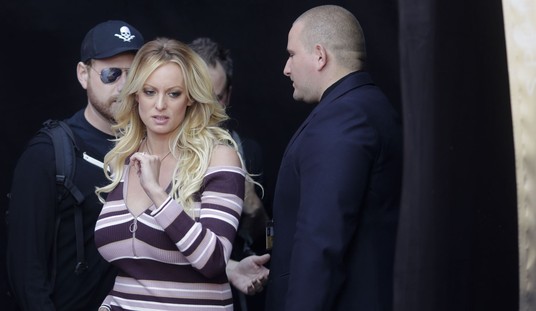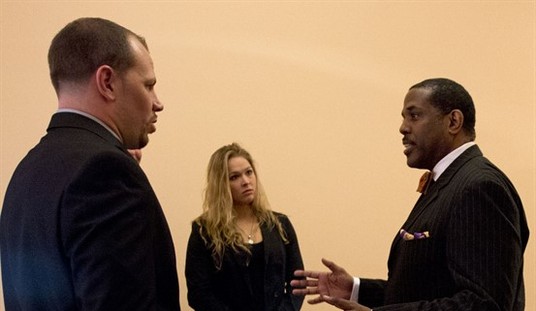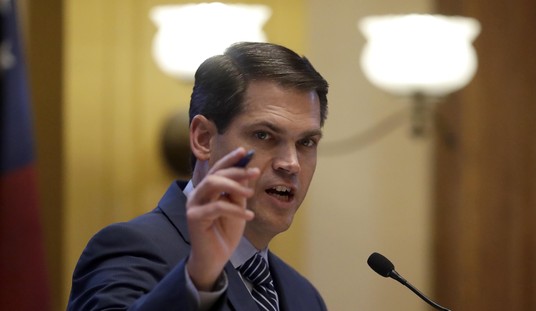
If anybody deserves an interview with PJ Media, it’s certainly P.J. O’Rourke — although as I explained to him before we began rolling, while many of us have been inspired by his writing, our Website’s name of course derives from a scandal involving a very different journalist.
O’Rourke has made a career of puncturing the excesses and pretensions of tyrants both domestic and abroad, and anyone who wishes to impose big government statism on others. And since that’s been the goal of the Baby Boom since Tom Hayden wrote the Port Huron Statement in 1962, it’s no surprise that O’Rourke would eventually devote a book to his own generation’s myriad excesses.
During our interview, he’ll discuss:
● Did an AARP membership card lead to Osama bin Laden’s death?
● Were the radical shifts in culture in the 1960s foreshadowed by any previous decades?
● How do the freshman, sophomore, junior, and senior classes of the boomers differ from each other?
● Did the younger boomers learn anything from their older classmates?
● How did growing up as a boomer make P.J., in his college days, a man of the left, and how did he eventually join the vast right-wing conspiracy?
● The secret Hillary Clinton, Cheech & Chong connection, revealed at last!
● Does hashish and dynamite mix?
And much more. Click here to listen:
[audio:http://pjmedia.com/eddriscoll/files/2014/02/pj_orourke_interview_2-5-14-1.mp3](22 minutes and 42 seconds long; 20.7 MB file size. Want to download instead of streaming? Right click here to download this interview to your hard drive. Or right click here to download the 3.89 MB lo-fi edition.)
If the above Flash audio player is not be compatible with your browser, click on the video player below, or click here to be taken directly to YouTube, for an audio-only YouTube clip. Between one of those versions, you should find a format that plays on your system.
[jwplayer config=”pjmedia_eddriscoll” mediaid=”71091″]
Transcript of our interview begins on the following page; for our many previous podcasts, start here and keep scrolling.

MR. DRISCOLL: This is Ed Driscoll and we’re speaking today with the legendary P.J. O’Rourke, frequent contributor to the Weekly Standard and the Wall Street Journal, and now the Daily Beast, and the author of The Baby Boom: How It Got That Way (And It Wasn’t My Fault) (And I‘ll Never Do It Again). It’s published by Grove Atlantic and available from Amazon.com and your local bookstore.
And P.J., as someone who has inspired a whole generation of conservative and libertarian pundits and bloggers — including myself — thank you for stopping by PJ Media.
MR. O’ROURKE: Well, you’re very welcome. And I suppose we should do full disclosure that I actually ‑‑ I, P.J. don’t have anything to do with PJ Media. I mean, not that I don’t have anything to do with you in a pejorative sense. Here I am. But we’re not connected.
MR. DRISCOLL: No, not at all, but we’re glad you’re here today, as were saying before began recording, talking PJ to PJ.
MR. O’ROURKE: Glad to be here.
MR. DRISCOLL: After traveling the world and describing various war-torn regions in books such as Holidays in Hell, and writing about your experiences behind various fast and dangerous cars, in The Baby Boom, you’re traversing the ultimate foreign country, the past. What made you decide to write a book about both the baby boom, and your experiences as a boomer?
MR. O’ROURKE: Well, I think it was the realization that the youngest baby boomers were turning fifty. This is the year of the baby boom, according to AARP Magazine, and they ought to know. It’s still my opinion that the way that Osama Bin Laden got found was that he turned fifty. AARP doesn’t miss often.
MR. DRISCOLL: So they tracked him down, just by sending him a membership card!
MR. O’ROURKE: Exactly.
MR. DRISCOLL: Okay.
MR. O’ROURKE: And you know, all NASA had to do was read their mail some.
MR. DRISCOLL: P.J. in The Baby Boom, you note that the decade of the 1920s was remarkably similar to the decade of the 1960s, to the point where, as you write, “Everything the Baby Boom set out to do in the 1960s had been done already, forty years before. But, suddenly and completely, it had disappeared.” Could you talk about the similarities between the two decades?
MR. O’ROURKE: Yeah. I mean, both were ‑‑ you know, there were drugs, there was jazz. I think it was a pretty terrible movie, this latest version of The Great Gatsby, but the point that they were making by putting rap in place of jazz, was a point well taken. It was girls bobbing their hair, rolling their stockings down to their knees. It was petting and necking. It was a wild and crazy time, you know, and all the sort of speakeasy culture.
And it was considered extremely shocking by the Victorian types who were in charge. But it happened in a very different world historical context. It wasn’t just the Depression that put an end to the 1920s. It was the looming threat of war and totalitarian ideas. The 20s was just this little blip of sort of post-war peace and prosperity, whereas the baby boom had a long, long run. I mean, even counting the Vietnam War, the baby boom had a long run of growth. And the destruction of these horrible ideologies, they are gone forever. And so that the ‘20s just never got to stick around.
MR. DRISCOLL: Were the people having all this fun in the 1920s what you call in the book the “Idiot Generation,” or were they trying to recover from what the Idiot Generation had done to them in the previous decade?
MR. O’ROURKE: Well, I suppose, the real idiot generation would be the one that started World War I, although the Hitler types were certainly on deck. But most of the 1920s people were actually too ‑‑ Hemingway was an exception ‑‑ most of them were really too young to have fought in the [War]. I mean, they came into their twenties in the 20s. They were not quite old enough to have fought in World War I. And so they were a little bit like the baby boom in that they came after a horrible event that had basically been run by their parents.
MR. DRISCOLL: Well, between the idiot generation and the boomers, we had the so called “greatest generation”, a/k/a our parents.
MR. O’ROURKE: Right.
MR. DRISCOLL: What’s your take on them?
MR. O’ROURKE: Well, I admire them tremendously. I mean, I admire them for all that they went through and all that they did. But I also admire them for basically having all the ideas that the baby boom was to put into action.
Circumstance did not allow them to act on a lot of the impulses that the baby boom did. Between the Depression and the war, and what we would now call post traumatic stress disorder that followed the war, they ended up as a very sort of cautious generation.
And yet, when you look back on things like integration of schools, that was the greatest generation that did that, not the baby boom. You know, civil rights march, that’s the greatest generation. Martin Luther King belonged to the greatest generation.
A lot of the really important things that would form the 60s were actually [accomplished by pre-boomers]. I mean, Timothy Leary was born in 1922, for Pete’s sake. So there was a whole thing going on with the greatest generation that never had a chance to express itself, because they were forty by the time all this awful stuff was over and, you know, maybe a little too tired to go for it.
You know how ticked off you can feel about somebody who’s doing something that you’ve always wanted to do but never quite got up the nerve to do, and they’re out there doing it; and how irritated you can be at them?
MR. DRISCOLL: Um-hum.
MR. O’ROURKE: Or how irritated one can be at them, I should say?
I think that was really what the Archie Bunker and Meathead thing was really about.
MR. DRISCOLL: You describe the baby boomers in terms of high school classes — Seniors, Juniors, Sophomores, and Freshmen. How do those classes differ, and did the younger classes learn anything from their elders?
MR. O’ROURKE: It’s a enormous generation, seventy-five or seventy-six million people, just the Americans, and not counting the post-war baby boom elsewhere. And I was trying to figure out some way to sort them. And I thought, well, a generation that never grows up — let’s sort them as high school class.
And so I belong to the senior class, people born right after the war. While we were right at the forefront, right on the bow wave of the baby boom voyage of exploration, we were also very closely tethered behind the prior generation. We were attached to the greatest generation.
And so we ended up getting dragged under the boat, getting keelhauled essentially, by the whole experience. And I mean, I think the easiest illustration of that is that both Hillary Clinton and Cheech of Cheech & Chong, are members of the baby boom senior class.
By the time the early 50s come along, things have loosened up a little bit, and parents have kind of given up, to a certain extent. Many of those baby boomers born in the early 50s are younger siblings of the older baby boomers. And they were actually wilder. I mean, drugs for them weren’t an experiment; drugs were proven.
The real barefoot urchins from Haight-Ashbury generally belong to that early 50s group, and the teeny-boppers and the groupies and people like that.
And you know, eventually they found some shoes when they wandered into Silicon Valley, because that’s Bill Gates’ and Steve Jobs’ generation. (Never did find their neckties, you may notice.)
So that’s the junior baby boomers. Then you have the sophomore baby boomers. And they’re leery of this, because they’ve seen the baby boom in action, and they know what works in general doesn’t always work specifically when the bong sets fire to the bean bag chair. So they’re like a little more cautious about this stuff. And that’s The Preppy Handbook generation.
The last part of the baby boom generation is the freshman class. Now, that’s Barack Obama. And they just take all the stuff that formed the baby boom. They don’t remember any of it. They don’t have any visceral experience of the civil rights struggle or of the feminist, sort of, rebellion, of the inner city riots, of the Vietnam War. I mean, if they remember the Vietnam War at all, it’s just something that was unaccountably on television all the time like Ed McMahon. They don’t really get it.
And so they just think the world’s always been this way. And of course, for them, it always has. I think they’re the weakest link in the baby boom.
MR. DRISCOLL: Your book mentions a number of your childhood friends by name. I think there’s Billy Stumpf, there’s Steve Pensky, there’s Johnny McKay, there’s Jerry Harris.
MR. O’ROURKE: I did change all the names.
MR. DRISCOLL: Oh, okay.
MR. O’ROURKE: Yeah, this is not a memoir, because what I was trying to do here, was use the memories that I had that I felt corresponded to the memories that most people from my generation had.
I was quite dishonest about all this, which I admit right up front — I combined various people. Because I was trying to create types that we would all recognize, you know. Because a real memoir is about how different I am from you. And I was trying to write a kind of memoir about how ‑‑ how we were all the same. So I was looking for sameness.
And I’m pretty accurate. Those are pretty much individual real kids who I’m taking about when we’re very young. But by the time I get to high school, by then you know too many people. So I have to start throwing some characters together in order to keep from having too large a cast.
MR. DRISCOLL: Well, looking back on your earlier memories, does hashish and dynamite mix?
MR. O’ROURKE: No, no. No, it does not! No, when you’re fooling around with explosives, it’s important to have an acute sense of time. Because once you light the fuse, you’ve only got a certain amount of time to get out of the way. And I don’t think we’ve got the time or the space to explain that whole story, but let’s just say that you may think you’re really, really far away when you put some explosives out ‑‑ strictly for decorative purposes, mind you ‑‑ this didn’t have anything do to with politics ‑‑ and you may think it’s taking a really, really long time for the fuse to burn down. But you could be surprised.
And a whole bunch of us who set off some dynamite just for fun one day, ended up getting blown off the front porch of a house.
[Full story told about 13 minutes into O’Rourke’s recent C-Span interview, online here, and of course, in The Baby Boom — Ed]
MR. DRISCOLL: P.J., how did growing up as a boomer make you, in your college days, a man of the left, and how did you come to eventually join the vast right wing conspiracy?
MR. O’ROURKE: Well, I think it’s natural for kids to go through a period of leftism in any sort of modern, industrialized democracy; because basically, if you think about it, there’s only one time that Lenin’s “from each according to his ability to each according to his needs” really works. And that’s in the family. That’s what happens in a family, when we do practice a kind of communism in the family.
And of course, in developed countries, people stay in their families for a very long time, because there’s all the ‑‑ we don’t leave work [sic] at twelve and become apprentices and — or go off to sea as cabin boys. I mean, we stay with our family, you know, often through grad school, sometimes literally living in Mom’s basement.
At that point in life, everything in your experience has been some sort of ‑‑ somewhat socialist organization. Always talking about cooperation, whether it’s the Boy Scouts or your church group, or your football team, school, the family itself. Everything’s all about cooperation and about sharing, and we’re a team, there is no I in team. And you know, kid’s don’t understand the idea of property, really, because property for them is like an iPhone, you know?
They don’t understand that you might actually own something and that it might be yours, and that you might be sort of offended if somebody just like took it from you.
So I think it’s kind of natural for kids to go through a leftist stage. And then I think it’s also natural ‑‑ I wish it were as inevitable, but I think it is also natural for them to recover from it.
MR. DRISCOLL: The left have been waging war on suburbia even before Malvina Reynolds wrote “Little Houses of Ticky-Tacky” for the recently deceased Pete Seeger. What on earth did the people living in the suburbs ever do to make the far left hate them so?
MR. O’ROURKE: I guess what they did was anything they wanted. You know, it isn’t called collectivism for nothing. We’re all supposed to march in lockstep. And I think, it’s interesting that they chose to attack [suburbia] for its conformity. That was always the line, the keeping up with the Joneses, it’s all conformist, and so on. I mean the fact of the matter is, that if you give people freedom, it turns out quite a lot of them do want to do the same thing.
They want to have a comfortable house. They want to have a nice car. They want to have like space for their children and good schools.
Humans aren’t that different. And you can give humans tremendous liberty, they don’t all turn into Picassos — they just turn into normal people wanting to do normal things.
And this offended the left on two grounds. One is the freedom that these people had, and it was deeply offensive to the left. And the other thing was that there’s always been this leftist myth going back to the Communist Manifesto, that if people are relieved from the burdens of capitalism, that they will flower and that each kid who sits down at the piano will turn into Mozart. And of course, that doesn’t happen. I mean, folks are just folks.
MR. DRISCOLL: Of course, one of the reasons why the suburbs exist is the automobile. At the dawn of the Obama era, you wrote what was basically the death knell for the American automobile in the Wall Street Journal. Will we ever see the return of the car culture of the past, and how was it destroyed?
MR. O’ROURKE: Well, no, I don’t think we will see it. I think it’s destroyed by a couple of things. First of all, it’s destroyed by crowding. I mean, traffic’s terrible; let’s face it. The whole suburban idea was based upon a much lighter degree of traffic.
And the trouble is, traffic is no longer directional. I mean, traffic used to be a sort of breathing and in and out. People would go downtown to work, people would come back home at night. And you could kind of design roads for that.
But now that people both live and work in the suburbs and Person A is going clockwise and Person B is going counterclockwise. Washington, which has a circular beltway, hence “inside the Beltway,” Washington rush hour, morning and night, it is absolutely jammed in both directions. Go figure. And that’s because people aren’t actually going downtown to work, they’re going around to work over in Virginia, or they’re coming back; or they live in Virginia and they’re going around to work in Maryland.
And so the crowding takes a lot of fun out of the car culture.
And the other thing is that cars are becoming so incomprehensible, between all the safety features required and all the electronic features provided and all the mechanical complication necessary to cut down on pollution and improve fuel economy, that you can’t tinker with them anymore.
I mean, I’ve got a Chevy Suburban, and I’ve popped the hood on that. I don’t know what anything is in there.
MR. DRISCOLL: Over a decade ago, you wrote that “The founding fathers, in their wisdom, devised a method by which our republic can take 100 of its most prominent numskulls and keep them out of the private sector where they might do actual harm.” However, we’ve recently had a massive containment breach in the US Senate, between Barack Obama, Joe Biden, John Kerry, Chuck Hagel, and Hillary Clinton. Not to mention Harry Reid threatening a containment breach of his own by declaring the nuclear option.
P.J., how did so many of these numskulls break out of the rubber room?
MR. O’ROURKE: It’s a good question. I wish I had an answer to it. As politics becomes more pervasive in ordinary life, politicians, of course, take on an importance that they don’t deserve, especially this generation of politicians.
I mean, one of the things that I like about the baby boom is although our politics have been all over the map, which I really don’t understand, because I would have thought we would turn out to be libertarian, But while we have certain libertarian instincts, we did not turn out to be politically libertarian.
And then in fact, if you look at the three baby boom presidents we’ve had so far: George W. and Bill Clinton and Barack Obama, I mean, you map out their positions, and you’d have to go to Pyongyang to get outside that zone, you know?
In the end, the best and the brightest baby boomers did not wind up in Washington. They went to Goldman-Sachs. And it’s really a sort of second-rate part of the generation that wound up in Washington. But we’ve allowed the political machinery to get so big, that politicians become important in spite of themselves.
MR. DRISCOLL: As we mentioned before, many of your earlier books were travelogues such as Holidays in Hell. During your many travails, you must have heard plenty from the people you’ve interviewed regarding what the rest of the world thinks about American boomers.
MR. O’ROURKE: I think the rest of the world has got a very simple love-hate attitude toward America. You know, they hate us so much, they all want to move here. It’s what it comes down to.
I mean, I was over covering the Marcos overthrow in the Philippines a million years ago. It was a standing joke that people would come out and spend a certain amount of time demonstrating in front of the American Embassy, and then go around to the back to get in the visa line.
The thing is that America the place, America the people, baby boomers included, irritate a lot of the world, just because we’re so big and we’re so powerful. And, come on, you know, we are kind of loud and annoying at times.
But America the idea ‑‑ and this is really much more important ‑‑ the idea of America, the idea that people can be who they want to be, do what they want to do, that there’s a place where there’s liberty and opportunity, is immensely attractive to practically everyone in the world.
MR. DRISCOLL: P.J., last question. One of the warnings from A Parliament of Whores from the late 1980s, is that “Every government is a parliament of whores. The trouble is, in a democracy, the whores are us.” Where do you see America headed after eight years of the Obama administration?
MR. O’ROURKE: Well, we’re headed toward, a great deal more expense and complication and bureaucracy. And unfortunately, I think that we’re probably headed into a situation with the entitlement programs so vastly out of control and revenue so ill-matched to expenditure, that we’re going to wind up having to have our own Margaret Thatcher. I mean, we’re going to have to have some sort of crisis, maybe it’ll be a Greece-like crisis, or maybe it’ll be a like a Thatcher’s England crisis, but it’s not going to be pretty when it happens.
I think we’ll endure it. And I think we’ll get through it fine. I think we’ll probably return to some better thinking about politics after it. But there’s no doubt it’s going to be extremely painful when it happens.
MR. DRISCOLL: PJ, if that’s case, we’ll be relying on you to help us laugh away our sorrows. This is Ed Driscoll and we’ve been speaking with P.J. O’Rourke, the author of The Baby Boom: How It Got That Way (And It Wasn’t My Fault) (And I‘ll Never Do It Again). It’s published by Grove Atlantic and available from Amazon.com and your local bookstore. And P.J., thank you once again for stopping by PJ Media.com.
MR. O’ROURKE: You’re welcome. Good to talk to you.
(End of recording; for our many previous podcasts, start here and keep scrolling.)









Join the conversation as a VIP Member